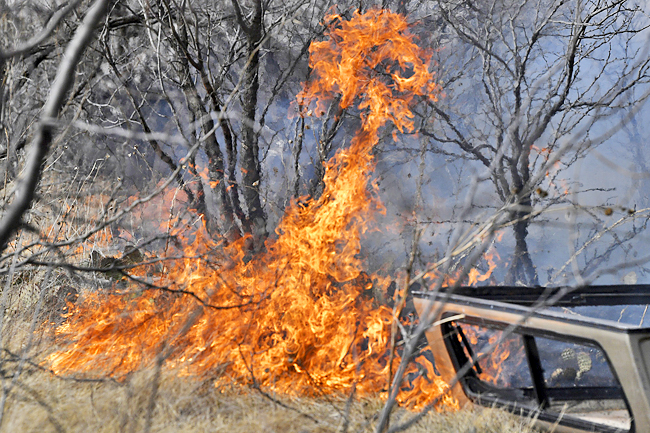EASTLAND, TEXAS (AP) – Fire crews in West Texas made progress yesterday against a massive complex of wildfires that have killed one person and burned at least 50 homes, officials said.
Winds diminished yesterday, raising hopes for the attack on the flames, said spokesman for the task force attacking the wildfire complex near Eastland, about 120 miles west of Dallas, Angel Lopez.
However, gusty winds were expected to return, again raising the wildfire threat to critical levels in western and central Texas, he said.
At a news conference in Eastland, Governor Greg Abbott said late on Friday that at least 50 homes had been destroyed by flames with more possibly to be found.
He declared a disaster in the 11 counties hardest hit by wildfires. The Texas A&M Forest Services warned that fires could also affect parts of Oklahoma and Kansas, and Nebraska warned of an extreme fire risk.

The Eastland County Sheriff’s Office released more details on the death of Deputy Sergeant Barbara Fenley. In a statement, the office said she was going door to door, getting residents to evacuate their homes on Thursday and it was “last heard that she was going to check on an elderly individual”.
“With the extreme deteriorating conditions and low visibility from smoke, Sergeant Fenley ran off the roadway and was engulfed in the fire,” the sheriff’s statement said. As of Friday afternoon, the fires had burned about 130 square miles, about 70 square miles in the Eastland Complex alone, according to Texas A&M Forest Service. The fires in that complex were only four per cent contained late on Friday, with fires burning in thick brush and grass fields.
About 18,000 people live in Eastland County. About 475 homes were evacuated in the town of Gorman, said spokesman for Texas A&M Forest Service Matthew Ford.
Several months of dry, windy weather have fuelled deadly wildfires in Kansas and Oklahoma, including one a few weeks ago. In remote, western Nebraska ranching country, a large wildfire has been burning for several days. Meteorologists said they were hopeful that rain showers expected early next week across the Plains would reduce the risk.
“We’ve been so dry that even an inch of rain would make a difference,” said National Weather Service meteorologist in Wichita Kansas Robb Lawson.


